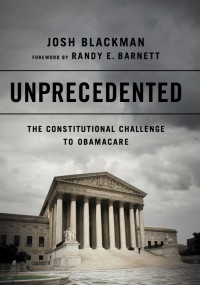 The peril of the President signing an incomplete version of the Affordable Care Act on March 23, 2010 is that there were lots, and lots of “bugs.” Under most circumstances, the bill would’ve gone through the reconciliation process to iron out these kinks. But the President could not do this. After the election of Scott Brown, the Senate would have been a filibuster dead-end. So the President pressed on with what was never meant to be the final version of the bill.
The peril of the President signing an incomplete version of the Affordable Care Act on March 23, 2010 is that there were lots, and lots of “bugs.” Under most circumstances, the bill would’ve gone through the reconciliation process to iron out these kinks. But the President could not do this. After the election of Scott Brown, the Senate would have been a filibuster dead-end. So the President pressed on with what was never meant to be the final version of the bill.
One of the recent bugs to emerge was that under the law, congressional staffers could no longer receive federal health benefits, and would have to enter the exchanges, without any subsidies. In other words, members of congress and their staff would have been screwed. To avert this crisis, the President personally became involved with the problem, and OPM released a regulation allowing the Feds to contribute to their premiums.
Why would the President get personally involved in such an issue?
According to John Bresnahan and Jake Sherman ofPolitico, President Obama has personally involved himself in the controversy over whether or not Congressmen and Hill staffers should retain access to their insurance subsidies. “It is extraordinarily rare, to say the least, for the president of the United States to get involved in an inside-the-Beltway flap over the payment of health care premiums,” note thePolitico authors.
They also report that “some lawmakers have privately threatened to push through a legislative fix—possibly attached to a must-pass spending bill—that would require the government to continue its contributions for health care premiums for Hill employees.” But the White House fears that such a legislative change would “open a door for Obamacare opponents to try to unwind other parts of the 2010 legislation, and senior administration officials want to avoid that step.”
That’s exactly right. Under no circumstances will the White House allow any of Obamacare to be subject to legislative revision. Frankly,any change would be used as a tool to delay or dismantle the law. We are stuck, for the foreseeable future, with a version of the law that was never meant to be final.
These changes must come straight from the White House.
But Bresnahan and Sherman now report that OPM has decided to allow the government to subsidize coverage for its employees on the exchanges. “A White House official confirmed the deal,” they report, “and said the proposed regulations will be issued next week.”
Even if OPM lacks the authority.
As the legislative history shows, Congress had numerous opportunities as the PPACA made its way through the legislative process to ensure the continuation of FEHBP employer subsidies for health insurance coverage for Members and staff, and to treat committee and leadership staffs the same as Member office staffs. Yet, Congress, with support from the President, enacted a piece of legislation that rather starkly requires Members and staff to either pay for their own health insurance out of their after-tax incomes, obtain coverage under a spouse’s plan, or purchase coverage in the new exchanges (subsidized for those with family incomes that qualify). Furthermore, the provision that Congress didenact engenders more confusion than clarity with respect to both its applicability and implementation.
The fact that Members are now surprised and worried about the implications of the PPACA for themselves, and profess shock at what they enacted, leads inescapably to the question, as asked by Robert Pear of The New York Times: “If they did not know exactly what they were doing to themselves, did lawmakers who wrote and passed the bill fully grasp the details of how it would influence the lives of other Americans?”[31]
In short, Congress can keep its current health coverage by repealing Section 1312(d)(3)(D). However, the political price for doing so is that Members of Congress must repeal the rest of Obamacare as well—so that their constituents can keep their health plans, too.
Perhaps we should wait for similar concessions for unions. It may come any day now. Wait till people figure out the mandate is not high enough to work, and the only way to raise it is by statute. Or, the President could so unilaterally. Wouldn’t be the first time.